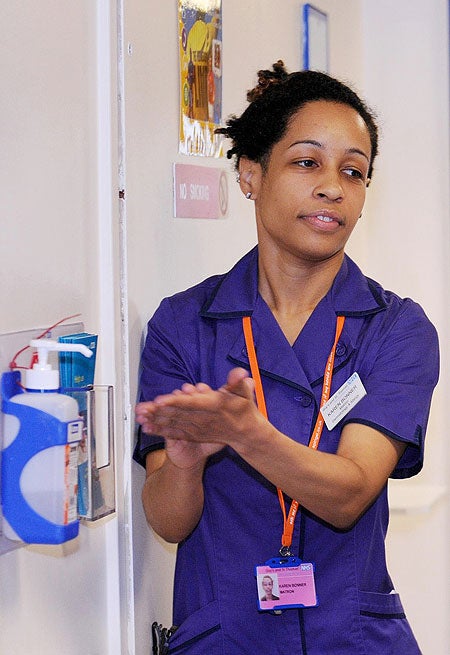Hospitals may be closed if they fail to meet basic standards of hygiene

All NHS trusts in England must improve standards of hygiene or face the risk of closure, an NHS watchdog warns today.
The threat from the Healthcare Commission, the independent health inspectorate, comes as a survey shows one in four NHS hospital trusts has failed to meet minimum hygiene standards for the second year running, putting patients at risk of potentially lethal infections.
Despite huge political and public pressure on hospitals to protect patients from superbugs including MRSA and C.difficile, many NHS trusts are failing to put the necessary measures in place, the Healthcare Commission says.
The worst hospitals could face sanctions and, ultimately, the threat of closure unless they improve, the commission warned. Under regulations to be introduced in April next year, all hospitals will have to register for an operating licence, which will be made conditional on meeting minimum standards on hygiene.
Anna Walker, chief executive of the Healthcare Commission, said: "By April 2009 all NHS trusts will have to be compliant with all aspects of the hygiene code. They have got 10 months to get there. This is a wake-up call."
There was "a lot" for trusts to do and "very few" met all aspects of the hygiene code, introduced two years ago, she said. A huge amount of effort was going in to curb the infection rate but the challenge was formidable.
Britain has some of the worst problems with healthcare associated infections in Europe and the issue has been at the top of the political agenda for the past three years. Polls show worries about contracting bugs such as MRSA now top patients' concerns about going to hospital, having overtaken waiting times.
The survey of all 169 acute hospital trusts in England found 41 (24 per cent) were unable to confirm they complied with all aspects of the hygiene code. Among primary care trusts, performance was worse, with more than a third unable to meet minimum standards.
Ms Walker said: "Infection control is fantastically important to patients and the public. We can't trivialise this, it has a got a grip of this country and we have to shift it." She did not expect hospitals or primary care trusts to be closed next year but those that failed to meet minimum standards would have sanctions imposed.
The survey of all NHS trusts in England is the first part of the Healthcare Commission's annual health check, under which trusts rank their performance against 24 standards covering quality of care, waiting times, safety, food and infections.
Follow-up inspections targeted at trusts where problems are suspected lead to a final rating published in October. Last year half of the trusts that received follow-up inspections had their scores downgraded.
The hygiene code covers infection control, decontamination of equipment and cleanliness of the environment. The survey found a small improvement in infection control and cleanliness. But there was a decline in trusts meeting standards on decontamination of equipment after rules were tightened.
Join our commenting forum
Join thought-provoking conversations, follow other Independent readers and see their replies
Comments
Bookmark popover
Removed from bookmarks